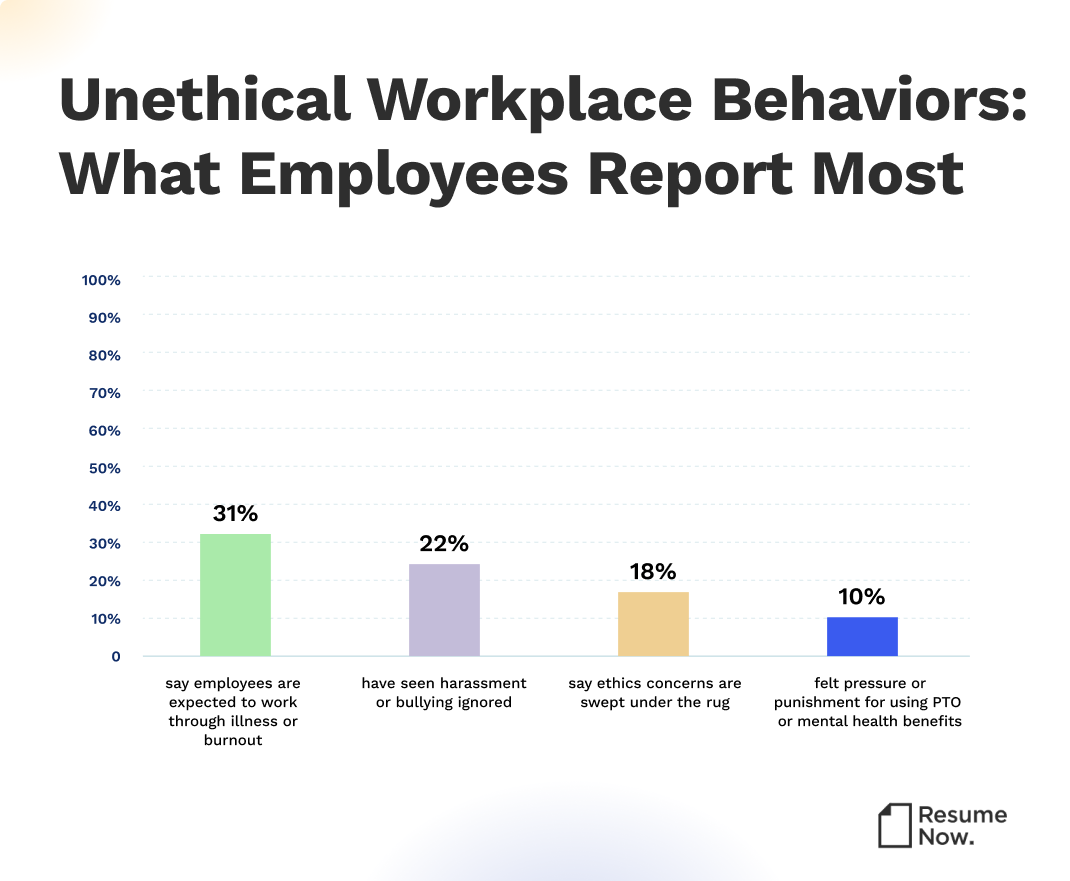Most companies say values matter, but new data shows many leaders don't walk the walk.
According to a new Values Gap Report from Resume Now, employees are struggling to trust their leaders. The survey of 1,000 U.S. workers reveals that while most companies promote their work values clearly, only a fraction of employees believe those values are upheld by leadership.
In fact, 70% say they've seen leaders bend the rules or play favorites—raising questions about fairness, ethics, and psychological safety at work.
In this post, we'll explore what employees are really seeing, why it matters, and how companies can close the gap between stated work values and actual behavior.
Key Findings
- Clarity ≠ consistency: 86% say company values are clearly communicated, but only 44% say they're consistently demonstrated.
- Rule-bending is rampant: 70% have seen leaders bend rules or engage in favoritism at work.
- Leadership authenticity in question: Just 47% believe their leaders frequently model the company's stated values.
- Favoritism and injustice: 43% have witnessed favoritism in promotions, raises, or recognition.
- Toxic exceptions: 24% say toxic top performers are protected by leadership.
Ethics in Action
Ethical behavior isn't just a compliance box; it shapes trust, morale, and retention. But many employees report witnessing troubling behavior that directly contradicts company values.
When asked what unethical or troubling behavior they've witnessed at work:

- 31% say employees are expected to work through illness or burnout.
- 22% have seen harassment or bullying ignored.
- 18% say ethics concerns are swept under the rug.
- 10% felt pressure or punishment for using PTO or mental health benefits.
What this means: When unethical behavior is allowed to continue or quietly dismissed, employees stop believing that their concerns matter. It creates an environment where people feel unsupported and hesitant to speak up. To retain trust and talent, companies must respond to issues consistently and show that values apply in real situations, not just written policies. Promoting an environment that models conflict-resolution skills and facilitates safe and healthy work relationships is key to preventing burnout. On the employee side, developing your communication skills and clearly establishing boundaries can help establish healthy relationships at work.
Trust and Psychological Safety at Work Are Eroding
Even when work values are clearly communicated, they lose meaning if employees don't feel safe being honest. The data shows that many workers are holding back or hiding parts of themselves to avoid conflict or consequences.
- Only 41% feel comfortable raising ethical concerns.
- 11% fear retaliation if they do.
- 54% feel pressure to "perform" a version of themselves that fits the company image.
What this means: Psychological safety is critical for employee well-being and long-term retention. When people don't feel safe sharing concerns or showing up authentically, it leads to stress, burnout, and disengagement. Companies that want to build strong cultures need to create environments where trust is the norm and employees don't feel like they have to wear a mask to succeed. For employees, finding a role that's a strong culture fit can improve the work experience. Do your research and ask thoughtful questions during the interview process to determine whether the company's priorities match your values.
Looking for a change of scenery? Our AI Resume Builder can help you land a new role by creating or updating your resume to meet the standards of the competitive job market.
Methodology
The findings in this report are based on a survey conducted with 1,000 U.S. workers on May 6, 2025. Participants were asked about ethical behavior, trust in leadership, and alignment between stated company values and lived experiences. The survey included a mix of multiple choice, scaled-response, binary, and multi-select questions to capture a wide range of perspectives on workplace culture and ethics.
For press inquiries, contact Joseph Santaella at joseph@resume-now.com.
About Resume Now
Resume Now is a powerful resource dedicated to helping job-seekers achieve their potential. Resume-Now's AI resume builder is a cutting-edge tool that makes creating a resume fast, easy, and painless. Resume Now has been dedicated to serving job seekers since 2005. Alongside its powerful AI resume builder and stylish, ready-to-use templates, it also features free advice for job seekers at every career stage, guides for every step of the hiring process, and free resources for writing cover letters. Resume-Now is committed to supporting job seekers and workers alike and has conducted numerous surveys related to the experience, trends, and culture of the workplace. These surveys have been featured in Business Insider, CNBC, Fast Company, Yahoo!, Forbes, and more. Keep up with Resume-Now on LinkedIn, Facebook, X, and Pinterest.
Keith is a Certified Professional Resume Writer (CPRW) and trusted media source in the career industry with over a decade of experience helping job seekers stand out.
More resources
![What Should a Resume Look Like in 2025? [+ Example] What Should a Resume Look Like in 2025? [+ Example]](/sapp/uploads/2024/08/what-should-a-resume-look-like-hero.png)
What Should a Resume Look Like in 2025? [+ Example]
A good-looking resume will always use simple fonts and an easy...

25 Common Job Interview Questions and Answers for 2025
Prepare for the interview with examples of some of the most co...

5 of the Best Resume Writing Services You Can Try Today
Discover the best professional resume writing services with th...

Federal Resume: Examples, Templates and Tips
As a federal employee your resume must stand out to capture t...

Nursing Student Resume: Examples, Templates & Tips for 2025
As a nursing student you need a resume that showcases your cl...

Scholarship Resume: Examples, Template & How-to Guide
As a scholarship applicant you need a resume that highlights ...
